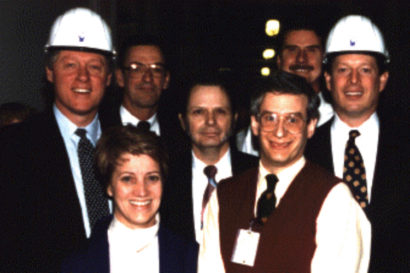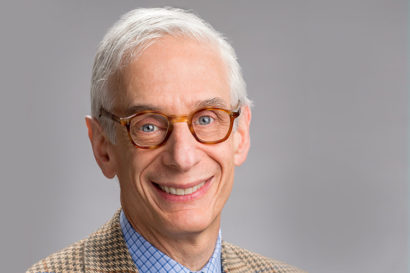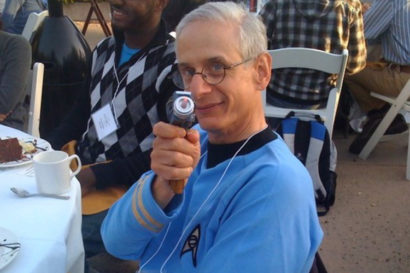Computer scientist Randy Katz named vice chancellor for research
Wireless pioneer to take the reins at a challenging time for research universities
December 6, 2017
Randy Howard Katz, who helped develop many of the wireless tools and fast, reliable computer storage we take for granted today, has been appointed vice chancellor for research at UC Berkeley.
Katz, the United Microelectronics Corporation Distinguished Professor in the Department of Electrical Engineering and Computer Sciences, will assume the position Jan. 1, 2018. He will take over from G. Steven Martin, who has served as interim vice chancellor since Paul Alivisatos was appointed executive vice chancellor and provost in July.
A 1980 Ph.D. graduate of UC Berkeley who joined the faculty in 1983, Katz is well known in the computer industry for his development of RAID computer storage systems in the 1980s with professor emeritus David Patterson and then-graduate student Garth Gibson. Short for Redundant Arrays of Inexpensive Disks, RAID storage today is a multibillion-dollar business that allows storing data in multiple places across an array of many small, parallel computers for quick retrieval and protection against loss or corruption of the data. He will be inducted into the Silicon Valley Engineering Hall of Fame in February for this work.
He is also known as the scientist who brought the nascent internet to the White House. In the 1990s, he set up the email accounts of former President Bill Clinton and Vice President Al Gore and built the original whitehouse.gov site, which has been the main portal into the executive branch ever since.
“I feel blessed to give back in leadership at this stage of my career, after a 40-year history at Berkeley,” Katz said. “I bring long experience with many dimensions of the research enterprise on campus, from research and student mentoring to government service and international collaboration.”
Katz acknowledges the challenging times ahead, however.
“Trust in higher education, the level of support for public higher education and belief in the importance of research to the excellence of an institution like ours are being undermined in the current social and political context,” he said. “I am very excited to be given the responsibility as vice chancellor for research, and hopefully I can make some positive advances in reversing that direction.”
Among the issues he’ll be dealing with is the new tax reform bill making its way through Congress, which could impact not only graduate student support by taxing tuition waivers, but also affect charitable donations and even corporate sponsorship of research.
“This is part of a change in the environment that is going to make things very challenging for universities in general,” he said.
Wireless pioneer
Katz first came to Berkeley from Cornell University as a graduate student in 1976, and after earning his Ph.D. was appointed an assistant professor at the University of Wisconsin, Madison, before being asked to return and join the EECS faculty in 1983. He left for two years in 1993-94 to serve as the deputy director of the Defense Advanced Research Projects Agency’s Computing Systems and Technology Office, during which time he worked with other agencies to bring the executive branch into the internet age.

Katz with President Bill Clinton and Vice President Al Gore in the early 1990s, when Katz helped set up their White House email accounts. Others are Janet Handel, Tom Weber, Jack Finley and Paul Tisdale.
In 1996, Katz became the first computer scientist to be appointed chair of the EECS department, a position he held until 1999. At the time of his appointment he was working on a new concept called wireless computing – an alternative to tying desktop computers to the internet though wires – and an interview in the college’s newsletter seems prescient.
“One day, every student at Cal is going to have some type of laptop that they’re going to want to take from the classroom to the coffee shop to the library,” he opined. He was instrumental in bringing the first experimental generation of the AirBears wireless network to the campus, and helped make it available to Berkeley students on a trial basis. Twenty years later, mobile computing is taken for granted.
Katz has also helped shepherd other innovations into common usage: wide-area wireless networks for mobile devices, cloud-based applications and cloud storage and ways of managing and protecting computer networks. He currently is involved with the RISELab – Real-time Intelligent Secure Execution — where he collaborates on projects to use machine learning to assess and control complex infrastructures, like buildings, energy and transportation systems, in real time.
Throughout, he has talked widely with industry researchers to disseminate UC Berkeley discoveries and encourage their adoption in the wider world. Today, researchers are more likely to start their own companies to get their discoveries to market, a shift that Berkeley has embraced.
“I believe that Berkeley has had a huge impact on the economies of the Bay Area and California and the country in general,” he said. “We need to not duplicate what is already provided by the startup ecosystem, which reaches from Silicon Valley through San Francisco to Berkeley already, but make it easy to take advantage of it and not get in the way of faculty and student entrepreneurialism on campus.”
As vice chancellor, he is also eager to advance efforts already underway to streamline research oversight and management systems on campus.
“The entire apparatus of research administration is really to support the faculty at the end of the day, and to make Berkeley the best possible environment for pursuing world-changing research,” he said. “Without that, we will not be able to continue to recruit the best and the brightest faculty, which is the reason why grad students and undergraduates want to come to Berkeley. That is going to be the obvious high priority for me.”
Katz has also had a profound impact on engineering education at Berkeley, and has been recognized for his dynamic teaching and mentoring with numerous honors, including the campus’s Distinguished Teaching Award. He has been a frequent instructor in the Freshman Seminars program, teaching courses on the history of communications technologies.
Katz is a member of the National Academy of Engineering and the American Academy of Arts and Sciences, as well as a fellow of the Association for Computing Machinery, the Institute of Electrical and Electronics Engineers and the American Association for the Advancement of Science.
Katz lives in San Francisco with his wife, psychologist Zoi Eliou, and his two rescue dogs, Benji and Lulu. An avid Giants fan – his parents gave him the same middle name as Willie Mays – he is also an amateur actor and playwright and a voracious reader of fiction and history.
MORE INFORMATION

